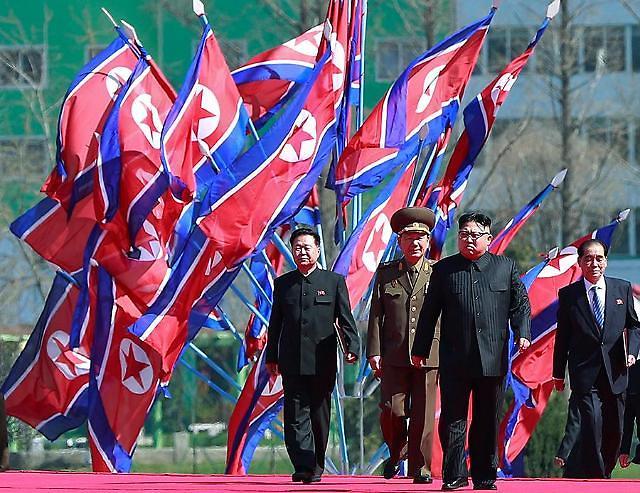
[EPA / Yonhap]
(This article was contributed by Kim Bong-hyun, former South Korean ambassador to Australia.)
The most important aspect of negotiation is trust building among dialogue partners. Trust makes the so-called "win-win negotiations" possible and ensures smooth implementation. Promises made without trust are not implemented well even if they are the result of 'win-win negotiations'.
Of a number of empirical experiments presented by Alan Axelrod that, an expert in negotiations, 'tit-for-tat' was a simple way to build confidence. This method has been accepted as the most useful way of negotiating so far as it is theoretically equivalent to the "repeated dilemma of prisoners" derived from a game theory. If a cycle of punishment for betrayal and cooperation for cooperation continues, the other party would read the agreed message and create trust and cooperation.
We have negotiated with North Korea for a long time. If we go back to the basics of negotiation, trust building will be the most important. Therefore, the 'Sunshine Policy' of the Kim Dae-jung administration or the 'trust process of the Korean peninsula' by the Park Geun-hye administration was the right direction.
However, 'tit-for-tat' requires time and patience as a process. If you leave the process unmatured, the effect will not be diminished but disappear altogether, or distrust will become even more serious.
In negotiations with North Korea, it often became the case that the tit-for-tat process lost patience before it matured. So, in negotiations with North Korea, it is difficult for us to have confidence in ourselves and North Korea can not trust us. Negotiations with North Korea are not possible in this situation. Even though they are possible, the effect will not last long.
I don't want to blame anyone for the position we stand today. It is a structural problem that the method of regime change in South Korea makes it impossible for the process to mature. It is now too late to return to 'tit-for-tat' and it is structurally difficult. Finally, we come to the conclusion that we should take aggressive measures to topple North Korea, or strengthen self-defense measures by recognizing North Korea's nuclear missiles.
Thae Yong-ho, a former North Korean minister, said in a lecture in April that there is a fireball of dissatisfaction like the lava that blooms in the hearts of the North Koreans. In particular, he stressed that if their group interests were encroached, they may take collection action as seen in the failure of the 'currency reform' pushed by Kim Jong-il.
However, it's just a long-standing hope that North Korea can collapse because of the collective action of its people. Adler, well-known as the philosopher of courage, said that courage is necessary for change, but he did not say how the courage could be given. What the North Koreans need is a courage for change, but where does it come from?
We can hope that this kind of courageous struggle for democratization may occur in North Korea as seen in the historic case of South Korea's successful democracy.
The problem is that North Koreans do not understand why and how their systems should change. President Bush called North Korea the axis of evil, but Kim Jong-un, his followers and even ordinary citizens do not think so. They will have great pride in Kim's achievement in nuclear and missile development. In her study of Nazism, especially in the course of the Eichmann trial, Hannah Arendt defined the devil as the word "banality of evil." The devil is not much different from the ordinary, and the same is true of North Korea.
The successful democratization of South Korea is because Koreans have integrated the universal value of a liberal democratic market economy into the values they should pursue in the framework of the ROK-US alliance, and considered the authoritarian regime as a devil. On the other hand, North Koreans do not think so because they believe that it's not different from China's in the context of their alliance.
After all, we can reach the conclusion that China's democratization should come first in order to apply the historical lessons of our democratization to North Korea. When the value system of China changes, North Koreans will clearly recognize the ruling class as the devil, and the process of democratization will be sprouted. At this point, the nuclear issue will be at its final destination, and at the same time, the ROK-US alliance will reach its final destination.
So we have to turn our eyes from North Korea to China. In order for China to change into a country that pursues the same values as those of the US, South Korea and Japan, the international community should actively pursue a policy of engagement with China. North Korea spent 20 years on developing nuclear weapons and missiles, and we will be able to reach the finish point perhaps at such a time.


![[COLUMN] Is it the end of dog farming?](https://image.ajunews.com/content/image/2023/12/06/20231206165042934346.jpeg)
![[COLUMN] Study-in-rural-village education project creates hometown for future generations](https://image.ajunews.com/content/image/2023/03/14/20230314171302400526.png)
![[COLUMN] Is it worth pushing North Korea on human rights?](https://image.ajunews.com/content/image/2022/12/16/20221216090024187766.jpg)